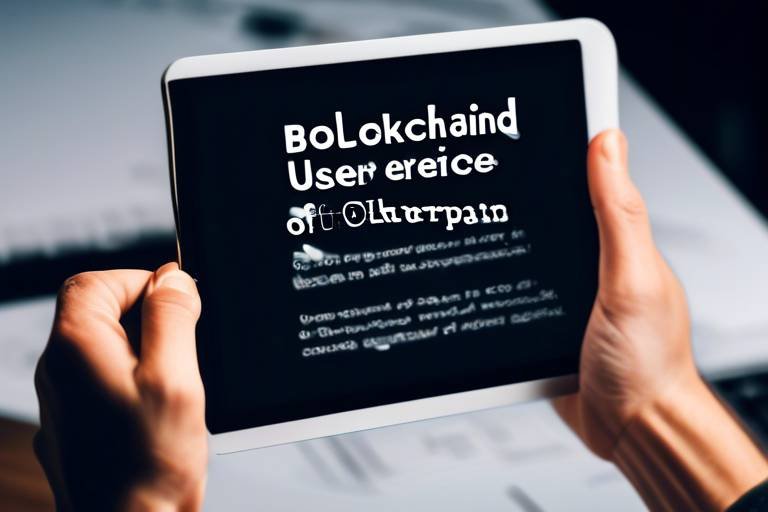The Role of Blockchain in Supporting Fair Labor Practices
In today's fast-paced world, where ethical concerns are at an all-time high, the intersection of technology and labor practices has never been more critical. Blockchain technology emerges as a beacon of hope, promising to revolutionize how we think about fair labor practices. Imagine a world where every worker is treated with dignity, where their rights are protected, and where transparency reigns supreme across industries. Sounds like a dream, right? But with blockchain, this dream is becoming a reality.
At its core, blockchain is a decentralized ledger that records transactions in a way that is secure, transparent, and immutable. This means that once a transaction is recorded, it cannot be altered or deleted, creating a permanent record that can be accessed by anyone with permission. This fundamental principle of transparency is particularly vital in labor practices, where the need for accountability and ethical standards is paramount.
By leveraging blockchain technology, organizations can ensure that their supply chains are not only efficient but also ethical. For instance, consider a clothing brand that sources materials from various suppliers. With blockchain, every step of the supply chain can be documented—from the sourcing of raw materials to the final product. This level of traceability ensures that companies can verify the ethical sourcing of their materials and the treatment of workers involved in the production process.
Moreover, the use of smart contracts can automate compliance with labor laws and regulations. These contracts execute automatically when predetermined conditions are met, enforcing fair labor standards without the need for intermediaries. Imagine a scenario where workers receive their wages immediately after completing their tasks, with no delays or discrepancies. This not only enhances trust among workers but also fosters a culture of accountability within organizations.
Real-time reporting and auditing capabilities provided by blockchain also play a crucial role in monitoring labor conditions. Stakeholders can access up-to-date information about labor practices, ensuring that any issues are promptly addressed. This proactive approach significantly reduces the risk of exploitation and abuse, creating a safer work environment for everyone involved.
Furthermore, the decentralized nature of blockchain empowers workers by giving them more control over their data and employment conditions. In a world where data privacy is increasingly under threat, workers can manage their information securely, ensuring that their rights are respected. This empowerment is essential for fostering a culture of fairness and equity in labor practices.
However, while the potential of blockchain in supporting fair labor practices is immense, it is not without its challenges. Issues such as scalability, accessibility, and technical barriers can hinder the widespread adoption of this technology. Organizations must navigate these obstacles to fully harness the benefits that blockchain offers.
In conclusion, the role of blockchain in supporting fair labor practices is transformative. By enhancing transparency, accountability, and efficiency, blockchain technology paves the way for a future where workers are treated fairly and ethically. As we continue to explore the possibilities of this innovative technology, it is crucial to remain vigilant about the challenges it presents, ensuring that the benefits are accessible to all workers, especially those in marginalized communities.
- What is blockchain technology? Blockchain is a decentralized digital ledger that records transactions securely and transparently.
- How can blockchain enhance labor practices? By providing transparency, traceability, and real-time reporting, blockchain can improve accountability and ethical standards in labor practices.
- What are smart contracts? Smart contracts are self-executing contracts with the terms of the agreement directly written into code, automating processes like compliance and payment.
- What challenges does blockchain face in labor practices? Scalability, accessibility, and technical barriers are some of the challenges that can hinder the adoption of blockchain in labor practices.

Understanding Blockchain Technology
Blockchain technology is often hailed as a revolutionary force in the digital landscape, but what exactly does it entail? At its core, blockchain is a decentralized ledger system that enables secure and transparent transactions across various platforms. Imagine a digital notebook where every transaction is recorded in a way that cannot be altered or deleted. This ensures that all parties involved have access to the same information, creating a level of trust that is often missing in traditional systems.
One of the fundamental principles of blockchain is its decentralization. Unlike traditional databases that are controlled by a single entity, a blockchain operates on a network of computers, or nodes, that work together to validate and record transactions. This means that no single party has control over the entire system, which significantly reduces the risks of fraud and manipulation. Each transaction is grouped into blocks, and once a block is filled, it is added to a chain of previous blocks, creating a permanent and unchangeable record.
Another key feature of blockchain is its use of cryptography to secure data. Each transaction is encrypted and linked to the previous transaction, forming a chain that is nearly impossible to break. This cryptographic security ensures that only authorized parties can access and modify the information, adding an additional layer of trust. In essence, blockchain acts as a digital fortress, protecting sensitive data from unauthorized access.
So, how does this technology apply to labor practices? Well, the potential is immense. By leveraging blockchain, organizations can enhance transparency in their supply chains, ensuring that every step—from the sourcing of raw materials to the final product—is documented and verifiable. This kind of transparency is crucial for promoting fair labor practices, as it allows stakeholders to monitor working conditions and ensure compliance with ethical standards.
Moreover, blockchain can facilitate the use of smart contracts. These are self-executing contracts with the terms of the agreement directly written into code. Imagine a scenario where a worker completes a task, and upon verification, the payment is automatically released without the need for intermediaries. This not only streamlines the payment process but also ensures that workers are compensated fairly and promptly.
But what about the challenges? While blockchain holds great promise, it’s important to acknowledge that the technology is still evolving. Issues such as scalability, energy consumption, and accessibility can pose significant hurdles. However, as more organizations begin to recognize the value of blockchain in supporting fair labor practices, innovative solutions to these challenges are likely to emerge.
In summary, understanding blockchain technology is crucial for grasping its potential impact on labor practices. With its decentralized nature, cryptographic security, and ability to enhance transparency, blockchain is set to transform how we think about labor rights and ethical standards in the workplace. The future is bright, and as we continue to explore this technology, we can anticipate a world where fair labor practices are not just an ideal but a reality.

Enhancing Transparency in Supply Chains
In today's global economy, the importance of transparency in supply chains cannot be overstated. Consumers are increasingly demanding to know where their products come from and the conditions under which they are made. This is where blockchain technology comes into play, offering a revolutionary way to enhance transparency and accountability throughout the supply chain. By providing a decentralized and immutable ledger, blockchain ensures that every transaction and movement of goods is recorded accurately and can be traced back to its origin.
Imagine a world where you could scan a QR code on your favorite pair of jeans and instantly access a complete history of their journey—from the cotton fields to the factory floor, and finally to your closet. This is not just a dream; it is a reality made possible by blockchain. With real-time visibility into supply chains, businesses can monitor labor conditions, ensuring that they meet ethical standards. This transparency not only protects workers but also builds trust with consumers who are increasingly concerned about the ethical implications of their purchases.
One of the remarkable features of blockchain is its ability to provide traceability of labor practices. For instance, when a company sources raw materials, blockchain allows them to verify the ethical sourcing of those materials and the treatment of the workers involved. This means that companies can confidently claim that their products are made under fair labor conditions, which is a significant step towards promoting ethical standards in industries notorious for exploitation.
Furthermore, the integration of smart contracts into the blockchain can automate compliance with labor laws and regulations. These contracts can be programmed to enforce fair labor standards, automatically verifying that all parties adhere to agreed-upon terms. For example, if a worker completes a task, a smart contract could trigger an immediate payment, ensuring that they are compensated fairly and promptly. This not only enhances transparency but also fosters a sense of security among workers, knowing that their rights are protected through automated processes.
Additionally, blockchain enables real-time reporting and auditing of labor conditions. Stakeholders, including consumers, regulators, and advocacy groups, can access up-to-date information about labor practices, reducing the risk of exploitation and ensuring that companies remain accountable for their actions. With this level of transparency, organizations are less likely to engage in unethical practices, knowing that their operations are under constant scrutiny.
In essence, enhancing transparency in supply chains through blockchain technology is not just about compliance; it's about creating a culture of accountability and trust. As we move towards a more ethical and sustainable future, the role of blockchain in promoting fair labor practices will only continue to grow, paving the way for a more equitable global economy.
- What is blockchain technology? Blockchain is a decentralized ledger system that enables secure and transparent transactions across various applications, including supply chains.
- How does blockchain enhance transparency? By providing an immutable record of transactions, blockchain allows for real-time visibility and traceability of products throughout the supply chain.
- What are smart contracts? Smart contracts are self-executing contracts with the terms of the agreement directly written into code, enabling automatic compliance and verification of labor standards.
- Can blockchain reduce labor exploitation? Yes, by increasing transparency and accountability, blockchain can help deter unethical practices and ensure fair treatment of workers.

Traceability of Labor Practices
In today’s global economy, where products are often sourced from various corners of the world, ensuring ethical labor practices can feel like searching for a needle in a haystack. However, blockchain technology offers a revolutionary solution by providing a robust framework for the traceability of labor practices. Imagine being able to track every step of a product's journey, from the raw materials to the final product, all while ensuring that the labor involved adheres to ethical standards. This is not just a dream; it is a reality made possible by blockchain.
At its core, blockchain functions as a decentralized ledger that records transactions across multiple computers. This means that once a transaction is logged, it cannot be altered retroactively, providing a reliable and transparent record of labor practices. With this technology, companies can verify the conditions under which their products are made. For instance, a coffee company can trace its beans from the farm to the cup, ensuring that the farmers are paid fairly and work in safe conditions. This level of transparency not only builds consumer trust but also holds companies accountable for their supply chains.
Furthermore, the traceability offered by blockchain can help identify and eliminate exploitative labor practices. By using smart contracts, companies can automate compliance with labor laws, ensuring that all parties involved in the production process are treated fairly. For example, if a supplier fails to meet the agreed-upon labor standards, the smart contract can automatically halt the transaction, preventing unethical practices from continuing unchecked.
Consider a table that illustrates the benefits of traceability in labor practices:
| Benefit | Description |
|---|---|
| Increased Accountability | Blockchain's immutable records ensure that all parties are held responsible for their actions. |
| Consumer Trust | Transparency in labor practices enhances consumer confidence in brands. |
| Reduction of Exploitation | Real-time monitoring helps in identifying and addressing unethical labor conditions swiftly. |
In conclusion, the traceability of labor practices through blockchain technology is not just a technological advancement; it is a necessary evolution in our approach to ethical labor. It empowers consumers, holds companies accountable, and promotes fair treatment across industries. As we move forward, embracing this technology could be the key to ensuring that every worker is treated with the respect and dignity they deserve.
- What is blockchain? Blockchain is a decentralized ledger technology that enables secure and transparent transactions.
- How does blockchain enhance labor practices? It provides traceability, accountability, and real-time reporting, ensuring ethical treatment of workers.
- Can blockchain eliminate exploitation in labor? While it cannot eliminate exploitation entirely, it significantly reduces the risk by increasing transparency and accountability.
- What are smart contracts? Smart contracts are self-executing contracts with the terms of the agreement directly written into code, allowing for automated compliance with labor laws.

Smart Contracts for Compliance
In the ever-evolving landscape of labor practices, smart contracts are emerging as a groundbreaking tool for ensuring compliance with labor laws and regulations. These self-executing contracts, which are written into the blockchain, automatically enforce the terms agreed upon by all parties involved. Imagine a world where compliance is not just a goal but a built-in feature of labor agreements. With smart contracts, this vision is becoming a reality.
At their core, smart contracts operate on predefined rules and conditions. When the conditions are met, the contract executes automatically without the need for intermediaries. This means that labor standards such as minimum wage, working hours, and safety regulations can be programmed directly into the contract. For instance, if a worker's hours exceed the agreed limit, the smart contract can trigger an automatic alert or even initiate a penalty for the employer. This level of automation not only enhances compliance but also significantly reduces the potential for human error or manipulation.
Furthermore, the transparency offered by blockchain technology means that all parties can easily access the contract and its execution history. This visibility fosters a sense of trust among employers and employees, as everyone can verify that the terms are being upheld. For example, a company could use a smart contract to ensure that all workers receive their salaries on time, and if any delays occur, the contract could automatically compensate the workers for their inconvenience. This not only protects workers’ rights but also promotes a culture of accountability within organizations.
However, the implementation of smart contracts is not without its challenges. Organizations must invest in the necessary technology and training to effectively utilize blockchain solutions. Additionally, there is a need for a collective understanding of legal frameworks surrounding smart contracts to ensure they are recognized and enforceable in various jurisdictions. Despite these challenges, the potential benefits far outweigh the hurdles. By automating compliance, smart contracts can drastically reduce the administrative burden on HR departments, allowing them to focus on more strategic initiatives.
In summary, smart contracts represent a significant leap forward in the quest for fair labor practices. They not only automate compliance with labor laws but also enhance transparency and accountability between employers and employees. As more industries begin to adopt this innovative technology, we may very well see a transformation in labor practices that prioritizes the rights and well-being of workers.
- What are smart contracts? Smart contracts are self-executing contracts with the terms of the agreement directly written into code, which automatically enforce compliance when certain conditions are met.
- How do smart contracts improve labor practices? They automate compliance with labor laws, enhance transparency, and reduce the risk of human error, ultimately protecting workers' rights.
- What challenges do organizations face when implementing smart contracts? Organizations may encounter technical barriers, legal uncertainties, and the need for training to effectively adopt blockchain technology.
- Can smart contracts be used in all industries? While they can be applied in various sectors, the effectiveness of smart contracts depends on the specific regulatory environments and technological readiness of each industry.

Real-time Reporting and Auditing
In today’s fast-paced world, the need for real-time reporting and auditing in labor practices cannot be overstated. Imagine a scenario where a company can instantly access verified information about the working conditions of its employees, regardless of where they are located. This is where blockchain technology steps in, acting as a powerful tool to enhance transparency and accountability. By utilizing a decentralized ledger, companies can ensure that data regarding labor conditions is not only accurate but also readily available to all stakeholders involved.
One of the most significant advantages of blockchain is its ability to provide up-to-the-minute insights into labor practices. Through smart contracts, companies can automate the collection and reporting of data related to employee welfare, working hours, and compliance with labor laws. This means that instead of waiting for periodic audits, organizations can continuously monitor their labor practices, allowing for immediate corrective actions when necessary. For instance, if a particular factory is reported to have subpar working conditions, stakeholders can quickly respond to address the issue before it escalates.
Furthermore, the use of blockchain facilitates secure audits. Traditional auditing methods can be cumbersome and prone to human error or manipulation. However, with blockchain, every transaction and update is recorded in an immutable manner, meaning that once data is entered, it cannot be altered or deleted. This creates a reliable audit trail that can be accessed by authorized parties at any time, ensuring that all labor practices are conducted fairly and ethically. Imagine having a transparent system where workers, employers, and regulatory bodies can all verify compliance with labor laws without the fear of data tampering. This level of transparency not only builds trust but also enhances the overall integrity of labor practices.
Moreover, the ability to conduct real-time audits means that companies can stay ahead of potential compliance issues, reducing the risk of legal penalties or reputational damage. By employing blockchain technology, organizations can proactively identify trends and patterns in labor practices, allowing them to implement changes that promote fair treatment. For example, if data reveals that workers in a specific region are consistently logging excessive hours, companies can investigate and address the underlying causes rather than waiting for an annual audit to uncover the problem.
In conclusion, the implementation of real-time reporting and auditing through blockchain technology is a game-changer for labor practices. It not only enhances transparency and accountability but also empowers stakeholders to take immediate action to ensure fair treatment of workers. As more organizations recognize the benefits of this technology, we can expect to see a significant shift towards more ethical labor practices across various industries.
- What is blockchain technology? Blockchain is a decentralized ledger that records transactions across multiple computers, ensuring that the data is secure and cannot be altered.
- How does blockchain enhance labor practices? By providing real-time visibility and immutable records, blockchain enhances transparency, accountability, and compliance with labor laws.
- Can blockchain reduce fraud in labor practices? Yes, the secure and transparent nature of blockchain helps deter fraudulent activities and promotes ethical behavior among stakeholders.
- What are smart contracts? Smart contracts are self-executing contracts with the terms of the agreement directly written into code, automating compliance and reporting processes.

Empowering Workers through Decentralization
Decentralization is more than just a buzzword; it's a revolutionary concept that can fundamentally change the way workers engage with their employment conditions and rights. Imagine a world where workers are no longer at the mercy of centralized authorities who dictate their terms of employment. Instead, they have the power to control their own data and negotiate their own terms. This is precisely what blockchain technology offers. By leveraging decentralized platforms, workers can access their employment information securely and transparently, enabling them to make informed decisions about their careers.
One of the most significant advantages of decentralization is that it fosters a sense of community among workers. On these platforms, individuals can connect with others in similar industries, share experiences, and collaborate on initiatives that promote fair labor practices. For instance, a group of workers in the textile industry might use a decentralized platform to advocate for better working conditions or wages. By banding together, they can amplify their voices and increase their bargaining power, making it harder for employers to ignore their demands.
Moreover, decentralization can lead to enhanced worker representation. Traditional labor unions often face challenges such as bureaucracy and limited reach, but decentralized platforms can democratize the labor movement, allowing any worker to participate in advocacy efforts. This means that even those in remote or marginalized communities can have their voices heard, ensuring that every worker's perspective is valued. In a decentralized system, every participant has an equal stake, creating an environment where fairness and equity can thrive.
Additionally, decentralized platforms can provide workers with access to essential resources and tools that were previously out of reach. For example, workers can utilize blockchain-based applications to track their hours, manage their contracts, and even receive payments directly without intermediaries. This not only streamlines the process but also reduces the risk of wage theft and exploitation. When workers have direct access to their earnings and employment data, they can make better financial decisions and advocate for themselves more effectively.
However, it's important to acknowledge that the transition to decentralized platforms comes with its own set of challenges. Not all workers are tech-savvy, and there may be a learning curve associated with using these new tools. Therefore, it's crucial to implement educational initiatives that help workers understand how to navigate blockchain technology effectively. By providing training and resources, we can ensure that all workers, regardless of their background, can benefit from the empowerment that decentralization offers.
In conclusion, decentralization holds immense potential for empowering workers in today's labor market. By providing them with the tools, resources, and community support needed to take control of their employment conditions, we can foster a more equitable and just work environment. As we move towards a future where blockchain technology becomes more integrated into labor practices, it's essential to prioritize inclusivity and accessibility, ensuring that all workers can harness the power of decentralization.
- What is decentralization in the context of labor?
Decentralization refers to the distribution of power away from a central authority, allowing workers to have more control over their employment conditions and data. - How can blockchain technology empower workers?
Blockchain technology enables secure and transparent access to employment information, facilitates collective bargaining, and reduces the risk of exploitation. - Are there challenges to adopting decentralized platforms?
Yes, challenges include the need for education on technology use and ensuring accessibility for all workers, especially those in marginalized communities.

Reducing Fraud and Corruption
Fraud and corruption are like a dark cloud hanging over labor practices, casting shadows on the rights and well-being of workers. These issues not only harm individual employees but also tarnish the reputation of entire industries. Imagine walking into a workplace where every promise made is backed by a solid guarantee, where every transaction is transparent and traceable. This is where blockchain technology steps in, acting as a beacon of hope in the fight against unethical practices.
Blockchain's inherent characteristics—security, transparency, and immutability—create a robust framework for reducing fraud and corruption in labor practices. By providing a decentralized ledger that records every transaction, blockchain ensures that no single entity can manipulate the data. This means that once information is entered, it cannot be altered or deleted without consensus from the network. Such a mechanism discourages fraudulent activities, as any attempt to tamper with records would be immediately visible to all stakeholders.
Moreover, the use of smart contracts on blockchain platforms can automate compliance and payment processes, further diminishing the opportunities for corrupt practices. For instance, a smart contract can be programmed to release payments only when certain conditions are met, such as the successful completion of a project or verification of labor conditions. This not only ensures timely payments but also holds employers accountable for their commitments. In essence, smart contracts act as a digital watchdog, ensuring that all parties adhere to agreed-upon terms.
To illustrate the impact of blockchain on reducing fraud and corruption, consider the following table:
| Traditional Labor Practices | Blockchain-Enabled Labor Practices |
|---|---|
| Opaque payment processes | Transparent, automated payments via smart contracts |
| Manipulable records | Immutable records that are publicly accessible |
| Limited worker rights | Empowered workers through decentralized platforms |
| Corruption in compliance checks | Automated compliance verification through blockchain |
Furthermore, decentralized platforms can provide workers with a voice, allowing them to report unethical practices without fear of retaliation. These platforms can serve as a space for collective bargaining, where workers can come together to advocate for their rights and interests. By leveraging blockchain, workers gain access to a safe environment where their concerns can be addressed transparently and effectively.
In conclusion, blockchain technology is not just a buzzword; it is a powerful tool that can significantly reduce fraud and corruption in labor practices. By enhancing transparency, ensuring accountability, and empowering workers, blockchain paves the way for a more equitable work environment. As we move forward, it is crucial for industries to embrace this technology, not only to protect their reputation but also to uphold the dignity of every worker.
- What is blockchain technology? Blockchain is a decentralized ledger system that records transactions across many computers, ensuring that the recorded data cannot be altered retroactively.
- How does blockchain reduce fraud? By providing immutable records and transparent transactions, blockchain makes it difficult for fraudulent activities to go unnoticed.
- What are smart contracts? Smart contracts are self-executing contracts with the terms of the agreement directly written into code, facilitating automatic compliance and payments.
- Can blockchain empower workers? Yes, blockchain can empower workers by providing them with a platform to voice their concerns and participate in collective bargaining.

Immutable Records for Accountability
In the realm of labor practices, accountability is paramount. This is where blockchain technology shines, offering a solution that is both innovative and effective. The concept of immutable records means that once data is recorded on the blockchain, it cannot be altered or deleted. This feature is a game-changer for ensuring accountability in labor practices. Imagine a world where every transaction, every labor agreement, and every compliance report is permanently etched in a digital ledger that is accessible to all stakeholders. This transparency not only fosters trust but also acts as a deterrent against unethical practices.
One of the most significant advantages of immutable records is that they create a reliable source of truth. For instance, if a company claims to adhere to fair labor practices, the blockchain can provide verifiable proof of their compliance. This is particularly important in industries that are often plagued by exploitation and fraud. With immutable records, stakeholders—including workers, regulators, and consumers—can easily access historical data related to labor practices. This access empowers them to hold companies accountable for their actions.
Consider a scenario where a garment factory claims to pay its workers a fair wage. By utilizing blockchain, all payment transactions can be recorded and made publicly accessible. This means that if a discrepancy arises, such as a worker claiming they were underpaid, the immutable record can be referenced to verify the payment history. Such transparency ensures that companies cannot hide behind misleading statements or manipulate data to evade responsibility.
Furthermore, the use of blockchain can significantly reduce the risk of fraud. In traditional systems, records can be altered or forged, leading to a lack of accountability. However, with blockchain's decentralized nature, the risk of manipulation is drastically minimized. Each transaction is time-stamped and linked to previous transactions, creating a chain of accountability that is incredibly difficult to break. This feature not only protects workers but also enhances the reputation of companies that are committed to ethical practices.
To illustrate the impact of immutable records, let's look at a comparative table:
| Traditional Systems | Blockchain Systems |
|---|---|
| Records can be altered or deleted | Records are permanent and unchangeable |
| Higher risk of fraud and exploitation | Lower risk due to transparent transactions |
| Limited access to historical data | Easy access to verifiable historical data |
| Accountability relies on trust | Accountability is built into the system |
In conclusion, the implementation of immutable records through blockchain technology not only enhances accountability in labor practices but also cultivates a culture of transparency and trust. As stakeholders become more aware of their rights and the tools available to them, the potential for fair labor practices increases exponentially. The future of labor rights could very well depend on the adoption of such innovative technologies, making the workplace a more equitable environment for everyone.
- What are immutable records? Immutable records are data entries that cannot be changed or deleted once they are recorded on the blockchain, ensuring a permanent and verifiable history.
- How does blockchain enhance accountability in labor practices? By providing a transparent and unchangeable record of transactions, blockchain ensures that companies can be held accountable for their labor practices.
- Can blockchain reduce fraud in labor practices? Yes, the decentralized nature of blockchain minimizes the risk of manipulation and fraud, fostering a more equitable work environment.
- What role do stakeholders play in utilizing blockchain for labor practices? Stakeholders, including workers and regulators, can access blockchain records to verify compliance and hold companies accountable.

Decentralized Platforms for Worker Rights
In today's fast-paced world, workers are often caught in a web of corporate bureaucracy, where their voices can get lost in the shuffle. Enter decentralized platforms—a game changer for worker rights! These platforms leverage blockchain technology to create a space where workers can unite, advocate for their rights, and negotiate better working conditions without the interference of traditional hierarchies. Imagine a world where workers can directly connect with one another, share their experiences, and collectively push for change. This is not just a dream; it is becoming a reality thanks to the innovations in decentralized systems.
So how do these platforms actually work? At their core, they utilize the principles of decentralization to empower workers. By removing intermediaries, workers can engage in collective bargaining directly with employers. This means that instead of relying on union representatives or third parties, workers can negotiate their terms through a transparent and secure platform. For instance, a group of factory workers can band together on a decentralized platform to voice their concerns about working conditions or wages, all while maintaining anonymity and security. This level of empowerment is revolutionary, as it gives workers a direct line to advocate for their rights without fear of retaliation.
Moreover, decentralized platforms can provide essential resources and tools for workers. They can offer educational materials about labor rights, legal assistance, and even financial services tailored to their needs. By having access to these resources, workers are better equipped to understand their rights and the avenues available for recourse if those rights are violated. It’s like giving them a toolbox filled with everything they need to build a better work environment for themselves.
However, the journey is not without its challenges. While the potential is immense, the adoption of these platforms requires a shift in mindset from both workers and employers. Workers need to be educated about how to use these technologies, and employers must be willing to engage in these new forms of communication and negotiation. Additionally, there is the issue of accessibility; not all workers may have the technological resources or literacy to navigate these platforms effectively. Therefore, creating an inclusive environment where everyone can participate is crucial.
In conclusion, decentralized platforms for worker rights represent a significant shift towards empowerment and equality in the workplace. By harnessing the power of blockchain technology, these platforms can help dismantle the barriers that have historically silenced workers. The potential for collective action and advocacy is enormous, paving the way for a future where every worker has a voice and the ability to fight for their rights. As we move forward, it is essential to continue fostering these innovations while addressing the challenges that come with them, ensuring that no worker is left behind in this digital revolution.
- What are decentralized platforms?
Decentralized platforms are online systems that operate without a central authority, allowing users to interact directly with one another. They leverage blockchain technology to ensure transparency and security. - How do decentralized platforms support worker rights?
These platforms empower workers to collectively negotiate their rights and working conditions without intermediaries, providing them with tools and resources to advocate effectively. - What challenges do decentralized platforms face?
Challenges include the need for worker education on technology, ensuring accessibility for all workers, and fostering a willingness among employers to engage with these new systems.

Challenges and Limitations of Blockchain
While blockchain technology holds immense promise for transforming labor practices, it is not without its challenges and limitations. One of the most significant hurdles is scalability. As more users join the network and transactions increase, the system can become congested, leading to slower processing times. This is particularly concerning for industries that require real-time data and quick responses, such as labor management. Imagine trying to send a message in a crowded room; the more people that join in, the harder it becomes to communicate effectively.
Another challenge is the technical barriers to adoption. Many organizations may lack the technological infrastructure or expertise to implement blockchain solutions effectively. This can create a divide between those who can leverage the technology and those who cannot. For instance, smaller companies or those in developing regions may find it difficult to invest in the necessary resources to adopt blockchain, leaving them at a disadvantage. Additionally, the complexity of blockchain systems can deter organizations from making the leap, as they may fear the potential disruptions to their current operations.
Moreover, ensuring inclusivity and accessibility in blockchain applications is vital. Many marginalized workers, especially in developing countries, may not have access to the internet or the necessary devices to participate in blockchain networks. This raises concerns about creating a two-tier system where only certain groups benefit from the advantages of blockchain technology. To address this, it is essential to develop strategies that ensure all workers, regardless of their background or location, can access and benefit from blockchain solutions. This might involve community training programs or partnerships with local organizations to bridge the digital divide.
In addition to these challenges, there are also concerns regarding regulatory compliance. As governments and regulatory bodies catch up with the rapid advancement of blockchain technology, organizations may face uncertainty about how to comply with existing labor laws and regulations. This can lead to hesitance in adopting blockchain solutions, as businesses may fear potential legal repercussions. It’s akin to navigating a maze without a map; the uncertainty can be daunting, and companies may prefer to stick with traditional methods rather than risk running afoul of the law.
Despite these challenges, the potential benefits of blockchain in supporting fair labor practices are undeniable. It is crucial for stakeholders—governments, businesses, and workers alike—to collaborate and find solutions that address these limitations. By fostering an environment of innovation and support, we can harness the power of blockchain to create a more equitable labor landscape.
- What are the main challenges of implementing blockchain in labor practices? The main challenges include scalability issues, technical barriers to adoption, inclusivity and accessibility concerns, and regulatory compliance uncertainties.
- How can organizations overcome technical barriers to blockchain adoption? Organizations can invest in training, partner with technology providers, and gradually implement blockchain solutions to mitigate technical challenges.
- What steps can be taken to ensure inclusivity in blockchain applications? Community training programs and partnerships with local organizations can help marginalized workers gain access to blockchain technology.
- Why is regulatory compliance a concern for businesses using blockchain? As blockchain technology evolves faster than regulations, businesses may face uncertainty about how to comply with existing labor laws.

Technical Barriers to Adoption
Adopting blockchain technology in labor practices is not as straightforward as it might seem. While the potential benefits are vast, several technical barriers hinder its widespread implementation. One major challenge is the scalability of blockchain networks. As more transactions occur, particularly in large supply chains, the existing infrastructure may struggle to keep up. This can lead to delays and increased costs, making it less appealing for companies to switch to blockchain solutions.
Moreover, the complexity of blockchain technology itself can be a significant hurdle. Many organizations lack the technical expertise required to develop and maintain blockchain systems. This gap in knowledge can create a reliance on third-party providers, which may not always align with the company's ethical standards or labor practices. Consequently, companies might hesitate to adopt blockchain for fear of losing control over their labor practices.
Another important aspect to consider is the interoperability of different blockchain systems. With numerous platforms available, organizations may find it challenging to ensure that their blockchain solution can communicate effectively with others. This lack of standardization can lead to inefficiencies and fragmented data, undermining the very transparency that blockchain aims to provide.
Furthermore, the initial investment costs for implementing blockchain technology can be daunting. Organizations may need to allocate significant resources for the development and integration of blockchain systems into their existing operations. For smaller companies, these costs can be prohibitive, leading to a slower adoption rate across the industry.
Lastly, there is the issue of regulatory compliance. Different regions and industries have varying regulations regarding data privacy and labor practices. Navigating these complex legal landscapes can be overwhelming for organizations looking to implement blockchain solutions. Without clear guidelines, companies may be reluctant to embrace blockchain, fearing potential legal repercussions.
In summary, while blockchain technology holds immense promise for enhancing fair labor practices, overcoming these technical barriers is essential for its successful adoption. Organizations must invest in education, infrastructure, and collaboration to harness the full potential of blockchain in promoting ethical labor standards.
- What is blockchain technology? Blockchain is a decentralized ledger system that allows for secure and transparent transactions.
- How can blockchain enhance labor practices? By providing transparency, accountability, and efficiency, blockchain can help ensure fair treatment and ethical standards in labor practices.
- What are the main challenges to adopting blockchain? Key challenges include scalability, complexity, interoperability, investment costs, and regulatory compliance.
- Can blockchain help reduce fraud in labor practices? Yes, blockchain's immutable records can deter unethical behavior and provide a reliable source of truth.

Addressing Inclusivity and Accessibility
Inclusivity and accessibility are crucial when it comes to leveraging blockchain technology for fair labor practices. While blockchain offers revolutionary potential, it’s essential to ensure that all workers, particularly those from marginalized communities, can benefit from its advantages. Imagine a world where every worker, regardless of their background, has equal access to information about their rights and the conditions of their labor. That’s the vision we should strive for!
One of the primary challenges is the digital divide. Many workers in developing regions lack access to the internet or modern technology. This gap can prevent them from engaging with blockchain platforms that could enhance their working conditions. To address this issue, organizations must prioritize the development of user-friendly interfaces and invest in infrastructure that supports internet access in underserved areas.
Moreover, education plays a pivotal role in ensuring inclusivity. Workers need to understand how blockchain works and how it can benefit them. This is where community outreach and training programs come into play. By providing workshops and resources, organizations can empower workers with the knowledge they need to navigate blockchain systems confidently. For instance, companies can collaborate with local NGOs to offer educational sessions that demystify this technology.
Additionally, it's vital to consider language barriers. Many blockchain platforms are primarily developed in English, which can alienate non-English speaking workers. To combat this, developers should incorporate multiple languages into their platforms, ensuring that all workers can access crucial information in a language they understand. This simple change can make a significant difference in fostering an inclusive environment.
Furthermore, we must also consider the design of blockchain applications. These platforms should be intuitive and easy to navigate, catering to users with varying levels of technical expertise. By employing principles of universal design, developers can create systems that are accessible to everyone, including those with disabilities. This means considering visual impairments, cognitive challenges, and other factors that may hinder a user’s ability to interact with the technology.
Lastly, ongoing feedback from users is essential. Blockchain developers should create channels for workers to voice their concerns and suggestions. This approach not only fosters a sense of community but also helps developers understand the unique challenges faced by different groups of workers. By actively listening to users, we can create a more inclusive blockchain ecosystem that truly serves its purpose of promoting fair labor practices.
- What is blockchain technology? Blockchain is a decentralized ledger system that enables secure and transparent transactions.
- How does blockchain enhance labor practices? It promotes transparency, accountability, and efficiency, ensuring fair treatment across industries.
- What are smart contracts? Smart contracts are self-executing contracts with the terms directly written into code, automating compliance with labor laws.
- How can blockchain empower workers? By decentralizing data control, workers can have more authority over their employment conditions and rights.
Frequently Asked Questions
- What is blockchain technology?
Blockchain technology is a decentralized ledger system that allows for secure and transparent transactions. It operates on a network of computers, where each transaction is recorded in a block and linked to the previous block, forming a chain. This ensures that once data is recorded, it cannot be altered, providing a reliable source of truth.
- How does blockchain enhance transparency in supply chains?
Blockchain enhances transparency by providing real-time visibility into supply chains. Every transaction is recorded on the blockchain, allowing stakeholders to track the journey of products from raw materials to finished goods. This visibility helps ensure that labor conditions are monitored and reported accurately, promoting fair labor practices.
- What are smart contracts and how do they work in labor practices?
Smart contracts are self-executing contracts with the terms of the agreement directly written into code. In labor practices, they can automate compliance with labor laws by verifying conditions and processing payments automatically. This reduces the risk of human error and ensures that fair labor standards are upheld consistently.
- In what ways can blockchain empower workers?
Blockchain can empower workers by providing them with more control over their data and employment conditions. Decentralized platforms built on blockchain technology allow workers to engage in collective bargaining and advocacy, giving them a voice in their work environment and enhancing their rights.
- How does blockchain help reduce fraud and corruption in labor practices?
Blockchain helps reduce fraud and corruption by maintaining immutable records of all transactions. This means that once information is entered into the blockchain, it cannot be changed or deleted, creating a reliable audit trail. This accountability deters unethical behavior and fosters a more equitable work environment.
- What are the challenges of implementing blockchain in labor practices?
Implementing blockchain in labor practices can face technical barriers, such as the complexity of the technology and the need for specialized knowledge. Additionally, there are issues related to scalability and accessibility, particularly for marginalized workers who may lack access to the necessary technology or training.
- How can inclusivity and accessibility be ensured in blockchain applications?
Ensuring inclusivity and accessibility in blockchain applications involves developing user-friendly platforms and providing education and resources to marginalized workers. Strategies may include community outreach programs, partnerships with organizations that support worker rights, and designing technology that is accessible to all users.



















